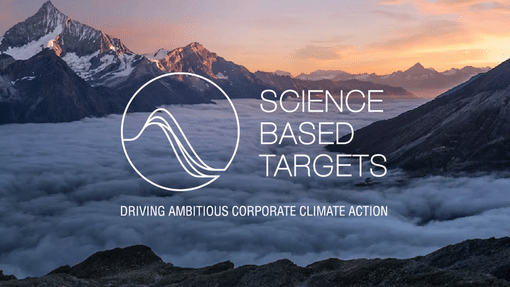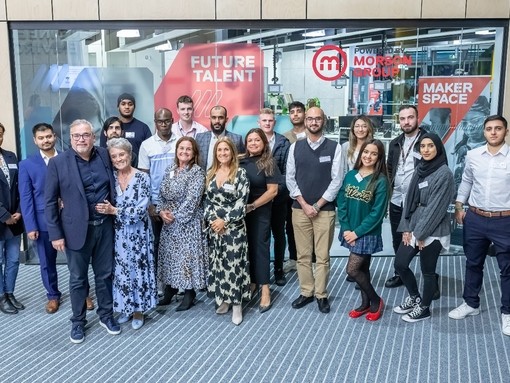
Embracing a sustainable future: Our commitment to Science Based Targets
In a world where the pressing concerns of climate change loom ever larger, businesses are being called upon to take action like never before.

As the consequences of global warming become increasingly apparent, corporations have a unique role to play in spearheading efforts to mitigate the effects of greenhouse gas emissions. In this vein, as part of our road to net zero, we are proud to announce our latest milestone in the journey towards a sustainable future: our commitment to the Science Based Targets initiative.
What is the Science Based Targets initiative?
At the heart of our commitment lies the concept of Science Based Targets (SBTs). This initiative is not merely a buzzword, but a concrete and scientifically backed approach to curbing greenhouse gas emissions. SBTs serve as a compass, guiding companies towards a clear and effective strategy to align their emissions reduction with the ambitious goals set forth by the Paris Agreement.
By providing businesses with a roadmap, SBTs empower them to understand exactly how much and how quickly they must reduce their emissions in order to avert the dire consequences of climate change. This involves adopting best practices in emissions reductions and net-zero targets, a crucial step towards a sustainable and resilient future for our planet.
One of the remarkable aspects of the Science Based Targets initiative is its comprehensive approach. It goes beyond offering mere guidelines by extending a helping hand to companies. This comes in the form of technical assistance, expert resources grounded in the latest climate science, and independent assessments from a team of seasoned experts. Such a multifaceted approach not only guarantees the efficacy of our efforts but also fosters a sense of collaboration and community among businesses worldwide.
Targets
Targets serve as well-defined and science-backed pathways for both companies and financial institutions to effectively curtail their greenhouse gas (GHG) emissions. These pathways have undergone rigorous assessment and validation by the Science Based Targets initiative (SBTi), ensuring their credibility and impact. Companies with established targets are readily recognisable within the dashboard’s ‘Target’ columns, where temperature alignments and dates are clearly indicated.
Commitments
Commitments, on the other hand, signify an organisation’s intent to formulate targets and undergo validation within a span of 24 months. These commitments are identifiable by the keyword ‘committed’ within the dashboard. Organisations under this category are in the process of developing science-based targets that are yet to be validated. Effective from March 2nd, 2023, entities failing to submit their targets within the stipulated 24-month commitment window will be denoted in the dashboard as having had their ‘Commitment removed’.
Near-term targets
Near-term targets encapsulate strategies that organisations employ to curtail their emissions, typically spanning a 5 to 10-year horizon. These targets are pivotal in catalysing the necessary actions to effect substantial emissions reductions by 2030. They not only exemplify a commitment to immediate change but are also a prerequisite for companies aspiring to establish net-zero targets.
Long-term targets
In contrast, long-term targets outline the extent of emission reductions organisations must accomplish to achieve net-zero emissions, adhering to the stringent criteria set forth by the SBTi’s Corporate Net-Zero Standard. These long-term targets necessitate realisation no later than 2050, although the power sector is challenged with a slightly earlier deadline of 2040. Companies aiming to set net-zero targets in alignment with the Corporate Net-Zero Standard are responsible for formulating these long-term targets.
Temperature alignment
Temperature alignment serves as a crucial indicator of a company’s synchronisation with global temperature escalation concerning preindustrial levels. This alignment hinges on the scope 1 and 2 targets companies set, aligning with the overarching objectives outlined in the Paris Agreement. Within the dashboard, temperature alignment is denoted by distinct values: 1.5°C, well-below 2°C, and 2°C, reflecting the company’s commitment to climate goals and corresponding temperature limits.
Joining a growing list of companies
Our commitment is part of a global movement that is gaining momentum by the day. With over 5,000 businesses from various corners of the globe on board, the Science Based Targets initiative has become a beacon of hope in the fight against climate change. Among the ranks of committed businesses are industry giants such as Chanel, Cartier, Accenture, Adidas, LEGO Group, IKEA, Hellofresh, KPMG, and Loreal. What’s even more inspiring is that around 60% of these businesses have already surpassed their approved and committed targets. Their achievements serve as both proof of concept and a testament to the tangible impact that can be achieved through unwavering commitment.
We are not content with just joining the ranks; we aim to set new standards. This isn’t merely an abstract goal; it’s a commitment to the planet, to our stakeholders, and to future generations. We remain dedicated to transparency, accountability, and collaboration, which we believe are the cornerstones of a successful sustainability journey.
As we navigate these challenging times, one thing remains abundantly clear: the need for collective action to combat climate change has never been more urgent. Our commitment to the Science Based Targets initiative is not just a step forward; it’s a stride towards a brighter, more sustainable future. With a growing community of committed businesses, a comprehensive approach to emissions reduction, and a timeline firmly in place, we are excited to pave the way for a world where businesses don’t just thrive, but thrive in harmony with the environment. Join us on this journey as we embrace the challenge and opportunity to shape a better tomorrow.
For more information about Science Based Targets, our Net Zero commitment, how we can support your business to achieve its sustainability goals or any other issues relating to HSQE, get in touch at Gareth.Morris@morson.com







